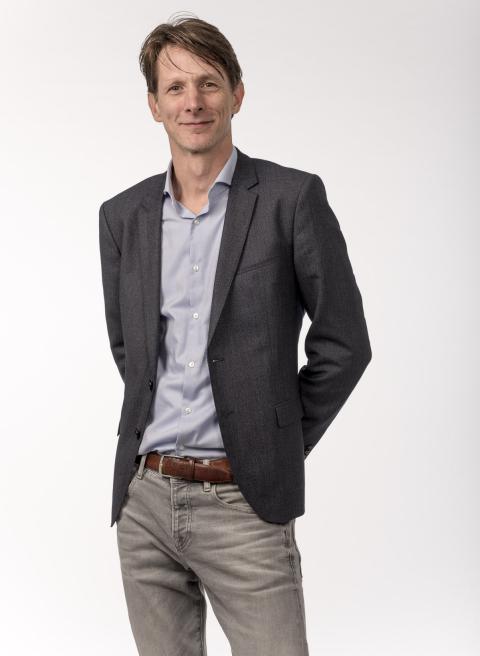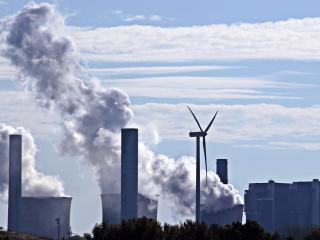5 tips from transition booster Alexander Savelkoul
Alexander Savelkoul’s major at Tilburg University – environmental economics – turned out to be the perfect foundation for his present position. As Energy System Transition Manager at Enpuls, he is responsible not only for shaping a vision of the energy transition, but also for making this vision a reality through lobbying, developing concepts, and conveying them to the market. Enpuls is part of Enexis Groep. A non-profit organization, it focuses on social responsibility as a catalyst of energy transition.
The transition is going to deliver new jobs, innovation, better air quality, more biodiversity, you name it
There are so many opinions and studies about sustainability, energy transition and carbon neutrality; how are ordinary people supposed to know what’s true?
“A lot is being written about climate change and sustainability, and unfortunately far from all of it is factually correct. I tell people to take a critical attitude toward everything they read. Wild tales about the astronomical costs of carbon reduction are generally wrong. And people who trivialize the climate crisis are mistaken. Climate change is happening, it’s caused by human activity, and it’s not going to stop by itself. It’s actually going to have a profound impact on society and on the planet. The cost of doing nothing will be many times greater than the cost of reducing our carbon emissions.”

Do you think we can really attain climate goals, and make society carbon neutral by 2050?
“Absolutely, we have all the technology we need and it’s getting cheaper all the time. Moreover, the challenge also presents lots of opportunities. The transition is going to deliver new jobs, innovation, better air quality, more biodiversity, you name it. It is vital, though, that the government maps out the route to 2050 with commitment and vision. When plans have broad support and have been translated into effective legislation, businesses and civilians follow naturally. Of course, it’s still essential that they are given the right incentives. We have to realize that time is short. We have to make the right structural choices now.”
How can we contribute as individuals?
“People often think first of solar panels, electric cars, and heat pumps. And they’re definitely valuable! But you can also make an impact by voting for a political party that seriously intends to tackle the climate issue. Of course, it’s important to look critically at energy waste, too. Think about your house insulation, how often you use the car, and how often you fly. Intensive livestock farming is also responsible for huge emissions, so eating less meat helps a lot, as does wasting less food. And take a good look at your own buying behavior. If you order a package from Ali Express, it has to come all the way from China.”
Wild tales about the astronomical costs of carbon reduction are generally wrong
How do you make the right choice when buying or installing sustainable solutions?
“There’s a lot of choice in green energy contracts, solar panels, and heat pumps. These days, the green energy market is pretty transparent; it’s easy to find out whether the electricity comes from Dutch wind turbines or foreign ones, for instance. But as far as the climate is concerned, it doesn’t even matter where it is. With regard to heat pumps, it’s very important to choose a competent installation technician. Many companies have little experience installing and fine-tuning heat pumps, which can mean that pumps are used sub-optimally. So always choose an experienced installer – and ask for references.”
We recently organized a ‘quote evening’ for the purchase of solar panels, and more than 100 neighbors turned up
What are you doing right now to prepare for the transition?
“I’ve worked in the energy sector for 20 years, and all that time I’ve been involved in energy transition, sustainable energy, and carbon reduction. Partly thanks to my daughter, who’s vegetarian, I also eat much less meat than I did before. I also drive an electric car, and I’m a member of a Buurkracht neighborhood team that helps local residents take energy-saving measures in their own houses. We recently organized a ‘quote evening’ for the purchase of solar panels, and more than 100 neighbors turned up.”

TIP 1 Always be critical of what you read
Wild tales about astronomical costs for CO2 reduction are generally incorrect.
TIP 2 Make good choices structurally
And don't wait too long. Time is running out.
TIP 3 Take a critical look at energy waste
Think carefully before you take the car or the plane.
TIP 4 Choose an installer with experience and references
Many companies have little experience with installing and adjusting heat pumps, which means that an installation may not be used properly.
TIP 5 Be well informed on the energy transition
Would you like to follow the facts, debates and latest developments on the energy transition? Alexander recommends the Twitter accounts of some renowned experts:
@MLiebreich
Michael Liebreich is an international authority on the energy transition and climate policy. He is the founder of Bloomberg New Energy Finance and CEO of Liebreich Associates.
@Sustainable2050
Kees van der Leun is the co-founder of Ecofys (now Navigant). He has an impressive career in sustainability and climate policy, and an intrinsic drive to halt climate change.
@AukeHoekstra
Auke Hoekstra is a researcher at Eindhoven University of Technology and the founder of ZEnMo, an ‘agent-based modeling’ organization. He is an expert in the refutation of false claims about sustainable energy and electric transport.
Photography: Enpuls, A. Savelkoul
Date of publication: 28 August 2019



